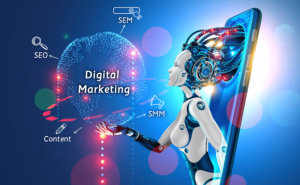Introduction
In the digital age, customer interaction has undergone a complete transformation. The advent of AI chatbots is at the forefront of this revolution, providing a new approach to customer service that benefits both businesses and their clients. They are efficient, always available, and capable of learning and improving over time, revolutionizing how businesses interact with their customers. In this blog, we’ll dive deep into how AI chatbots are shaping customer interaction.
What are AI Chatbots?

AI Chatbots, or Artificial Intelligence Chatbots, are computer programs that mimic human conversation using AI technologies such as Natural Language Processing (NLP) and machine learning. These chatbots can understand and respond to text or voice inputs from users, providing fast and relevant responses.
The purpose of AI chatbots goes beyond just replying to inquiries. They can learn from past interactions, understand the context, and provide personalized solutions to user queries.
AI Chatbots have found applications in various sectors, including e-commerce, banking, customer service, and even healthcare, proving their versatility and efficiency in handling customer interaction.
The Impact of AI Chatbots on Customer Service
AI chatbots are not just another technological fad. They are fundamentally changing the way businesses operate, especially in the area of customer service. Here are some ways AI chatbots are revolutionizing customer interaction:
- 24/7 Availability: AI chatbots can provide customer support around the clock. This eliminates the need for customers to wait for business hours to get their queries answered.
- Cost-Effective: AI chatbots reduce the need for a large customer service team, leading to significant cost savings for businesses.
- Instant Responses: AI chatbots can respond to customer queries in real time. This reduces waiting times and increases customer satisfaction.
- Scalability: During peak times, chatbots can handle a large number of queries simultaneously, something a human support team might struggle with.
- Consistency: AI chatbots ensure that the quality of customer service remains consistent, as they are programmed to follow certain rules and protocols.
- Personalized Experience: By using customer data, chatbots can provide personalized responses, enhancing the customer experience.
- Data Collection: AI chatbots can record customer interactions, providing businesses with valuable data about customer needs, preferences, and behavior patterns.
- Training and Upgradation: Unlike human agents, AI chatbots don’t require periodic training. They can be upgraded with new features and functionalities as they become available.
These are just a few of the many ways AI chatbots are improving customer service. They are not meant to replace human customer service representatives, but to augment their abilities and provide a better experience for customers.
Real-world Examples of AI Chatbots
Several businesses across the globe are harnessing the power of AI chatbots. Here are a few examples:
- Sephora: The beauty retailer uses a chatbot to offer makeup tutorials and product recommendations based on the user’s preferences.
- Duolingo: The language learning platform uses a chatbot to enhance language learning by providing learners with a conversational partner.
- Starbucks: The coffee giant uses a chatbot that lets customers order coffee via voice command or text.
These examples demonstrate the potential of AI chatbots in improving customer interaction and enhancing business operations.
Will AI Chatbots Replace Customer Support Jobs?

AI chatbots are undeniably making a significant impact on the field of customer service, leading many to question if they will ultimately replace human customer support roles. While it’s clear that chatbots offer numerous benefits such as round-the-clock service, instant responses, and scalability, it’s also crucial to recognize that they currently have limitations.
- Complex Queries: Despite the growing intelligence of AI chatbots, they still struggle with complex customer inquiries that require a nuanced understanding or human judgement. A chatbot may not fully understand the context or sentiment behind a customer’s request in the same way a human agent would.
- Emotional Intelligence: While chatbots are becoming better at understanding language, they still lack the emotional intelligence that humans innately possess. This is particularly important in customer service, where empathy and understanding can be vital in resolving a customer’s issue.
- Privacy Concerns: Privacy concerns are another area where human agents currently have an advantage. While chatbots can handle sensitive information, some customers may not be comfortable interacting with a bot for issues related to personal or financial details.
- Human Preference: There are customers who prefer to interact with humans, especially in emotionally-charged or complex situations. Some people find human interaction more satisfying, personable, and reliable.
So, while AI chatbots will likely take over more routine and straightforward tasks in customer service, they are unlikely to completely replace human customer support jobs. Instead, the future likely involves a hybrid model, where AI chatbots handle basic inquiries and humans step in to manage complex issues and offer a personal touch when needed.
That being said, the role of customer service representatives will inevitably evolve. As AI chatbots take on more routine tasks, customer service roles may become more about managing the AI systems and stepping in to handle complex, nuanced or sensitive situations that require the human touch. This could also elevate the role of customer service agents to more strategic, decision-making positions within organizations.
Overall, instead of viewing AI chatbots as a threat, customer service professionals should see them as a tool that can help them provide more effective, efficient service and free them up to focus on the aspects of their job that require a human touch.
The Future of AI Chatbots

- Increasing Complexity of Tasks: AI chatbots are expected to handle more complex tasks, moving beyond simple queries to provide intricate solutions. This can include technical support, handling financial transactions, and even diagnosing tech issues.
- Predictive Capabilities: With advancements in machine learning, AI chatbots will be able to anticipate customer queries and needs. They will offer solutions even before the customer asks, providing a proactive customer service experience.
- Emotional Intelligence: Future AI chatbots will be capable of understanding and responding to the emotional state of customers, thanks to advancements in sentiment analysis technologies. This will add another layer of personalization and effectiveness to their responses.
- Voice-Based Interactions: As voice recognition technology becomes more sophisticated, AI chatbots will handle more voice interactions, allowing users to engage with them as they would with a human.
- Increased Integration: AI chatbots will be increasingly integrated with other systems and platforms (like CRM systems, payment gateways, etc.), providing a seamless and holistic service experience to customers.
- Personal Virtual Assistants: AI chatbots will not only be restricted to businesses, but they will also become personal virtual assistants to individuals, managing calendars, setting reminders, and even making transactions.
- Real-time Language Translation: AI chatbots will likely offer real-time language translation, making them invaluable in customer support for businesses that operate across different geographical locations.
- Data Privacy and Security: As AI chatbots handle more sensitive tasks, the focus on data privacy and security will increase. Advanced encryption and privacy algorithms will be implemented to protect customer data.
With advancements in AI technologies, AI chatbots are expected to become even more sophisticated and integral to customer service. They are likely to handle more complex inquiries, understand emotions, and even anticipate customer needs before they arise.
AI chatbots are expected to play a crucial role in the future of customer service, providing a seamless and personalized customer experience. Businesses that adapt and implement these technologies will have a competitive edge in the market.
Conclusion
The rise of AI chatbots represents a significant shift in how businesses interact with their customers. By providing immediate, personalized, and efficient customer service, AI chatbots are revolutionizing customer interaction. As technology continues to evolve, the role and capabilities of AI chatbots will only continue to grow, heralding a new era in customer service.








